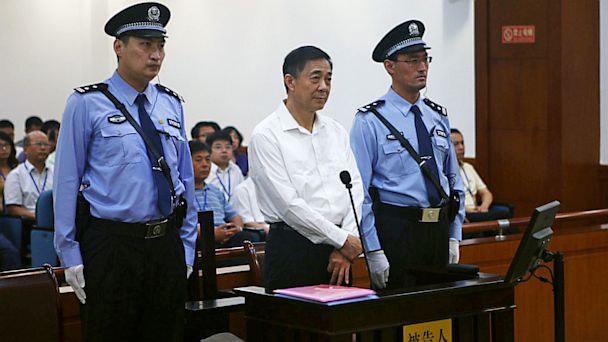China's Bo Xilai Defiant in First Day of Corruption Trial

Jinan Intermediate People's Court/Reuters
BEIJING-When disgraced Chinese politician Bo Xilai was marched out in front of a Jinan courtroom Thursday in the eastern province of Shandong, he was flanked by two towering court officers. They dwarfed the 6'1? former Chinese Politburo member.
For Bo, known for his stature and charisma, it was clearly orchestrated to be an emasculating display.
This was the former Chongqing Party secretary's first public appearance since March 2012 when he was detained, stripped of his posts and later charged with corruption, abuse of power and embezzlement. The closed-door trial has been dubbed the most significant trial in China since the infamous Gang of Four trial in 1980. It was the conclusion of the biggest political scandal to hit China in a generation (Click here for a brief history of the Bo Xilai saga) and was expected to be carefully choreographed.
After the initial entrance, however, Bo appeared to have thrown out the script, according to accounts of the trial provided to non-state media.
The 64-year-old fallen politician stayed true to his feisty reputation and was defiant from the start. Bo Xilai, who was once tapped to reach the upper echelons of Chinese power, was not going down without a fight.
In the opening salvo of what is expected to be a two-day trial, Bo scoffed at the first charge laid before him.
When asked by the court whether he had received 1.1 million yuan ($18,780) in bribes from Tang Xiaolin, a businessman and key witness for the prosecution, Bo flatly denied it.
According to transcript released by the Jinan Intermediate Court over the Chinese version of Twitter, Sina Weibo (that in itself an unprecedented move), Bo claimed that he made a false confession while being investigated by the Communist Party's disciplinary commission.
Bo told the court, "I had gone against my heart and admitted [accepting bribes from Tang and another businessman Xu Ming] while the Central Disciplinary Commission investigated me, and said I was willing to accept legal responsibilities."
He then added, "I had no knowledge of these details back then, my brain was blank."
Bo called Tang a "crazy dog," "corrupt man and fraudster" and said that Tang provided false "blasphemous" evidence against him in exchange for leniency in his own crimes.
Bo dismissed Tang's testimony as "the ugly performance of a person selling his soul."
Again and again throughout the first full day of the hearing, in a substantive back and forth with the prosecution, Bo deflected the charges against him by trying to point out holes in the prosecution's evidence.
Bo's wife Gu Kailai, who was found guilty last year in the murder of the British businessman Neil Heywood, also submitted written testimony which Bo decried as "very comical, laughable."
According to the testimony, Gu said that she took several hundred thousand Yuan and tens of thousands of US dollars from a shared safe in their homes in Northeastern Chinese city of Shenyang and Beijing. She used the funds, implied to be from the various bribes Bo took in over the years, while she was staying with their son Bo Guagua in the UK.
According to transcripts Bo scoffed and said that Gu, who had been a successful lawyer in her own right, did not need to take money from their shared stash because she had her own source of income that far exceeded the money she allegedly took from the safe.
When the Bo Xilai political scandal was at its height last year it had almost threatened the derail the prospects of a smooth once-in-decade transition of power in China. Now a year later and with the transition is proceeding without a hitch, Chinese President and Communist Party Secretary General Xi Jinping has been defining his first year in power by launching an anti-corruption drive within the Party.
"Things are settling with President Xi now. He wanted to use Bo's case to show his commitment to anti-corruption efforts and also to solidify his power," Hu Xingdou, professor at the Beijing Institute of Technology and a prominent blogger, told ABC News.
"Xi Jinping promised the people that he would punish both the 'flies' and 'tigers'," said Xu. "Bo Xilai might be the tiger he was referring to."
Despite the extraordinary move by the Jinan Intermediate Court to live-tweet the transcripts of the trial onto Sina Weibo, foreign journalists were not allowed inside the courtroom, only selected state media.
Instead they were relegated into a holding area outside the courthouse or a conference room in the nearby hotel which doubled as the official media center with a LCD television screen featuring the live micro-blog feed from the court.
Many believed that the limited access was in case Bo proved to be defiant. However his defiance as shown in the transcripts and the seeming openness of the live feed from the court were most likely intended to demonstrate that Bo was indeed getting a semblance of a fair and open trial.
Speaking to Reuters, Zhang Sizhi, the lawyer who defended Mao Zedong's widow Jiang Qing in the Gang of Four trial, offered this analysis: "He knows exactly what to say and what not to say. It seems some sort of understanding was reached ahead of time."
ABC News Beijing Bureau's Kaijing Xiao contributed to this story.